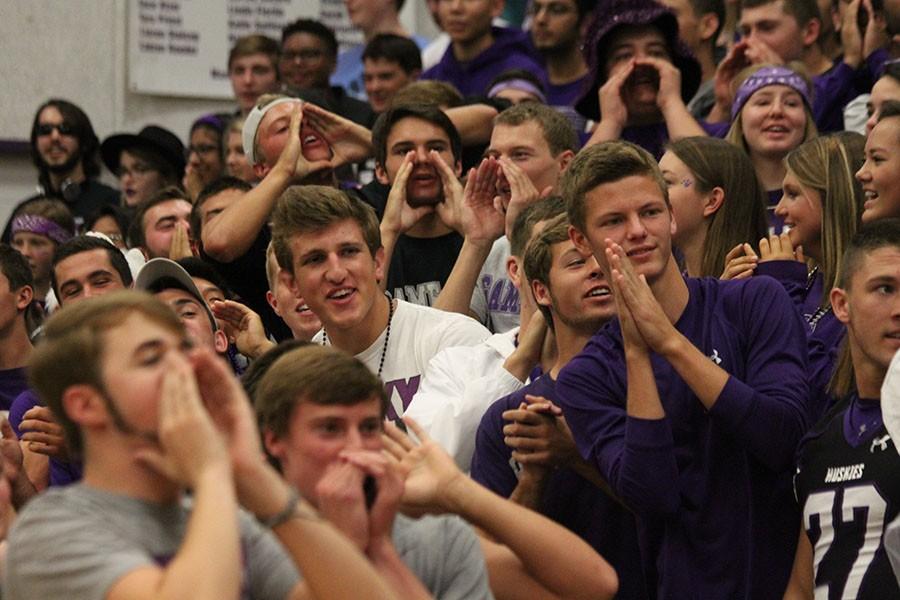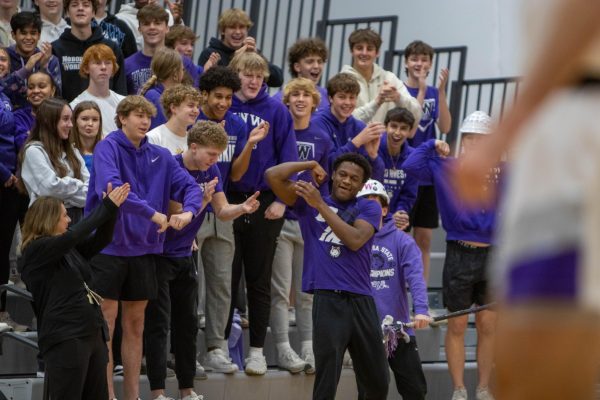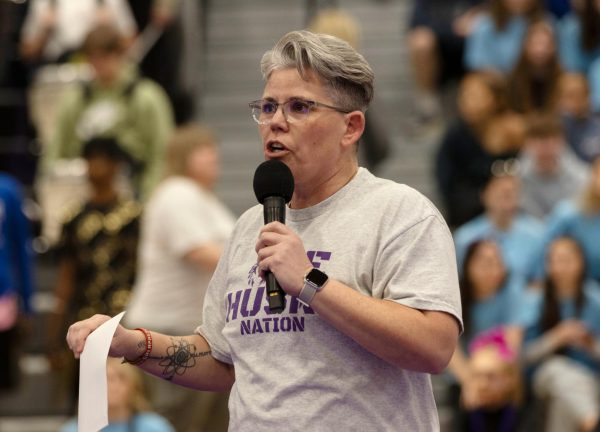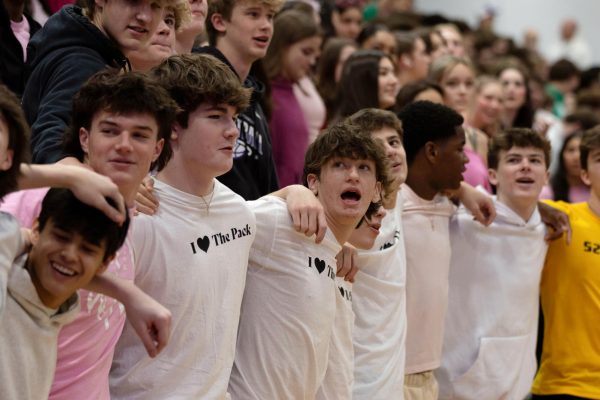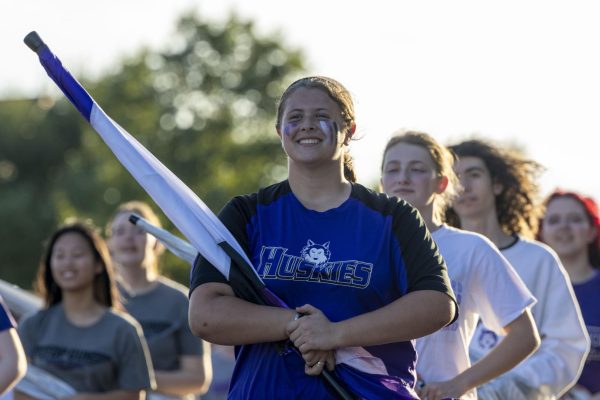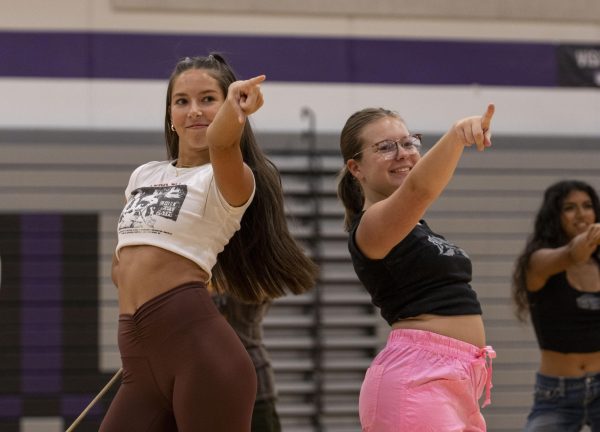A change in spirit
With spirit week beginning tomorrow, students and staff reflect on the rules created for Homecoming spirit week and their effects on spirit week.
Students cheer during the 2015 Homecoming assembly.
7:30 a.m., the school’s locker areas are empty. The parking lots are full, but the halls are quiet. The majority of the school has filed in the gym, freshmen and sophomores sitting on the floor, juniors and seniors on the bleachers. They watch their peers act and dance, but in ways different from the past.
Spirit week is an ongoing tradition at BVNW, but according to senior class president McKenzie Meehan, it has changed since her freshman year in more ways than one.
“I would say that over the years, the rules have definitely gotten stronger because I know we’ve had issues in the past, which makes sense because [spirit week is] something we don’t want to ruin for other classes or lose in general,” Meehan said. “Spirit week isn’t something that we want to go away [by] any means, so if we have to strengthen rules I don’t think it’s a big deal.”
 Senior Max McVicker, a participant in the morning spirit dances, said the rules in spirit week have become more restrictive in what administration allows to be said in order to keep people out of trouble.
Senior Max McVicker, a participant in the morning spirit dances, said the rules in spirit week have become more restrictive in what administration allows to be said in order to keep people out of trouble.
The rules, according to principal Amy Murphy, define morning performances as “dances” rather than skits, and performers must choose each day new criteria to meet. Criteria includes involving 50 percent new performers, including females, including a staff member or having a musical performance.
“It used to be a lot more free, open range,” McVicker said. “You could do whatever you want, but now they’re trying to put more restrictions so we don’t get in trouble for saying something we shouldn’t and the school doesn’t get in trouble for it.”
 While the spirit dances have started to involve more dancing, they still include a skit embedded within.
While the spirit dances have started to involve more dancing, they still include a skit embedded within.
Meehan said she believes people are worried about disobeying the rules.
“Now, they’re more like dances, and when I was a freshman they were more like skits,” Meehan said. “They were predominantly boys but they always involved the theme of the day. I wouldn’t say it was lenient, but you could definitely tell that some stuff was improv, some stuff wasn’t, and it was a great way to get everyone to come together in the morning and start spirit week.”
 McVicker is included in the skits for the senior class, and he said they focus more on dancing to stay out of trouble.
McVicker is included in the skits for the senior class, and he said they focus more on dancing to stay out of trouble.
“I feel like now [administration tries] to direct it toward dancing – you get more points if you do that just because it’s less talking,” McVicker said. “The less talking you do the less trouble you’re going to get in for it. The crowd seems to like when you do stupid dances and look dumb so that’s probably the biggest part of skits now.”
 The spirit skits, McVicker said, used to be for fun, but now they are more directed at getting points to beat the other grades.
The spirit skits, McVicker said, used to be for fun, but now they are more directed at getting points to beat the other grades.
“It used to be, the skits were just for fun out there,” McVicker said. “Now I feel it’s more points, people are trying to get more competitive throughout the grades and beat each other, which is good, it’s fun.”
 Skits are not the only thing that allow for points to be earned. McVicker said philanthropy has become part of his spirit week routine to earn more points for his grade.
Skits are not the only thing that allow for points to be earned. McVicker said philanthropy has become part of his spirit week routine to earn more points for his grade.
“People get pretty intense throughout the philanthropy, which is good because I never bought anything when I was a freshman or sophomore, but junior and senior year people started buying more stuff for philanthropy to get more points which is in the end good,” McVicker said.

Junior Morgan Lewis was a writer and reporter for one year and is now the sports coordinator for The Express and BVNWnews.com. She is also involved in volleyball at BVNW, NHS, Quill and Scroll National Honor Society for High School Journalists and band (marching and concert). She likes volleyball, snow, bro tanks, puppies, kittens, animals of any kind, Criminal Minds, Netflix, vacations, working out, reading almost anything and sucking at art. Her favorite part of newspaper is getting to know people at BVNW that she otherwise would not notice.

Senior Emily Staples was a photographer for one year and is now the photo editor for The Express and BVNWnews.com. She is involved in NHS, Quill and Scroll National Honor Society for High School Journalists and PEEPs. She likes bath bombs and Bernie Sanders, and her favorite part of newspaper is the dance parties.

Senior Olivia Baird has been a writer and reporter for one year, the opinion editor for one year and is now the online editor for BVNWnews.com. She is also involved in PEEPs and is a member of Quill and Scroll National Honor Society for High School Journalists and NHS. She is really into going out to eat at the Olive Garden, she's interested in how the Olive Garden makes such good breadsticks and a favorite of hers is the Olive Garden's breadsticks. Her favorite thing about newspaper is the cool mix of different people; she looks forward to working with every single person in newspaper every day.



